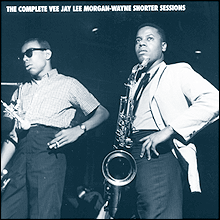![[Sidebar]](/standard/image/sidebar.gif)
![[Music Reviews]](/standard/image/headers/music_reviews_header.gif)
| clubs by night | club directory | bands in town | concerts | hot links | reviews & features |
Young lions
Lee Morgan and Wayne Shorter
by Ed Hazell
Morgan and Shorter
It might be an exaggeration to say that, between them, saxophonist Wayne Shorter and trumpeter Lee Morgan defined the hard bop of the 1960s -- but it's only a small exaggeration. Dozens of players contributed to the music, of course, but with the possible exceptions of drummer Art Blakey and pianist Horace Silver, few maintained such a central position in the vanguard of hard bop for as long as Shorter and Morgan. They were in Blakey's greatest Jazz Messengers unit -- which is to say one of the greatest jazz groups ever. After he moved to the Miles Davis Quintet, in 1964, Shorter played a key role in the line-up that stretched the genre to its limits. His 1964 Speak No Evil is a genuine masterpiece and one of the most influential albums of the decade. Morgan's own recording career peaked in 1963 with The Sidewinder, whose boogaloo title track became a Blue Note hit.The Complete Vee Jay Lee Morgan-Wayne Shorter Sessions, a new six-CD set from Mosaic, compiles Shorter's first three albums as a leader, two early Lee Morgan LPs, and The Young Lions, a session for Morgan, Shorter, and alto-saxophonist Frank Strozier, with plenty of alternate takes from all sessions. Recorded between November 1959 and November 1961, the albums showcase these two major talents at critical junctions in their careers. As Jazz Messengers, they were recording prolifically with Blakey, but on these sessions, which were made for the Chicago-based Vee Jay (one of the first labels owned by African-Americans), they were working to establish themselves as leaders. Each was shedding the last of his influences -- Shorter emerging from Coltrane's shadow, Morgan from Clifford Brown's. Shorter was also establishing himself as a major jazz composer, without question one of the most imaginative of the past 40 years. This box includes nearly 20 Shorter compositions, and the albums recorded with Blakey document almost as many -- an amazingly fertile output by any measure.
Morgan and Shorter were a contrasting but complementary pair. Morgan had a knack for funky licks as well as long bop lines that flowed with lightness and ease. He could ravish you with the sweetness of his sound, but there was just enough cockiness and grit there to give it an edge that was never heard from the angelic Brown. If Morgan was the smart sensualist, Shorter was the passionate intellectual. Shorter surprised listeners with the brilliant oddity of his ideas, the seemingly perverse accent or sudden strange harmonic passage that actually fit perfectly. His open tone owed much to Coltrane, but it had a blunter edge and could turn gruff and earthy.
The Mosaic box opens with The Young Lions, an album that makes it clear how well they worked together, especially on Shorter's dramatically unconventional "Peaches and Cream," where his darkly twisting lines and stark tone create a vivid contrast to Morgan's fat, sunny tone and surging lyrical statements. Morgan, who had previously led sessions for Blue Note, features saxophonist Clifford Jordan and drummer Blakey on his two for Vee Jay, Here's Lee Morgan and Expoobident (a neologism coined by hipster Babs Gonzalez). Morgan and Jordan establish their own warm front-line sound, and with Blakey providing his usual push, Morgan brings out all sides of his playing. On "Running Brook," from the first album, he builds a unified solo out of short phrases, each echoing the one that precedes it. "Terrible T" is pure Messengers territory, and Morgan has a field day, squeezing notes for funky inflections, hanging back deliciously as Blakey ups the tension beneath him. "Expoobident" features some of his most sparkling and involved soloing, and he remains inventive on both takes of Shorter's unusual 38-bar "Fire," turning out two markedly different solos.
And he's on hand for Shorter's debut as a leader, Introducing Wayne Shorter. The saxophonist opens with a characteristically tricky 21-bar "Blues à la Carte," and his authoritative solo, full of odd accents, immediately marks him as an original. On "Down in the Depths," a 64-bar melody, he bristles with ideas. Second Genesis, a quartet date with pianist Cedar Walton, includes a dark and dramatic "Pay As You Go" and "The Albatross," a moody ballad with a tightly knit thematic Shorter solo and brilliantly supportive work from Walton. Freddie Hubbard is the trumpeter on Wayning Moments, the last of Shorter's albums for the label. "Dead End" is full of asymmetric phrases and pregnant spaces. On the title track, Shorter's carefully modulated tone, his relaxed delivery, and his idiosyncratic logic make for a haunting performance.
None of these albums reached the heights of the masterpieces Shorter and Morgan would make for Blue Note in the remaining years of the decade. But they did serve notice that two major voices in jazz had arrived.
| home page | what's new | search | about the phoenix | feedback |
Copyright © 2000 The Phoenix Media/Communications Group. All rights reserved.
